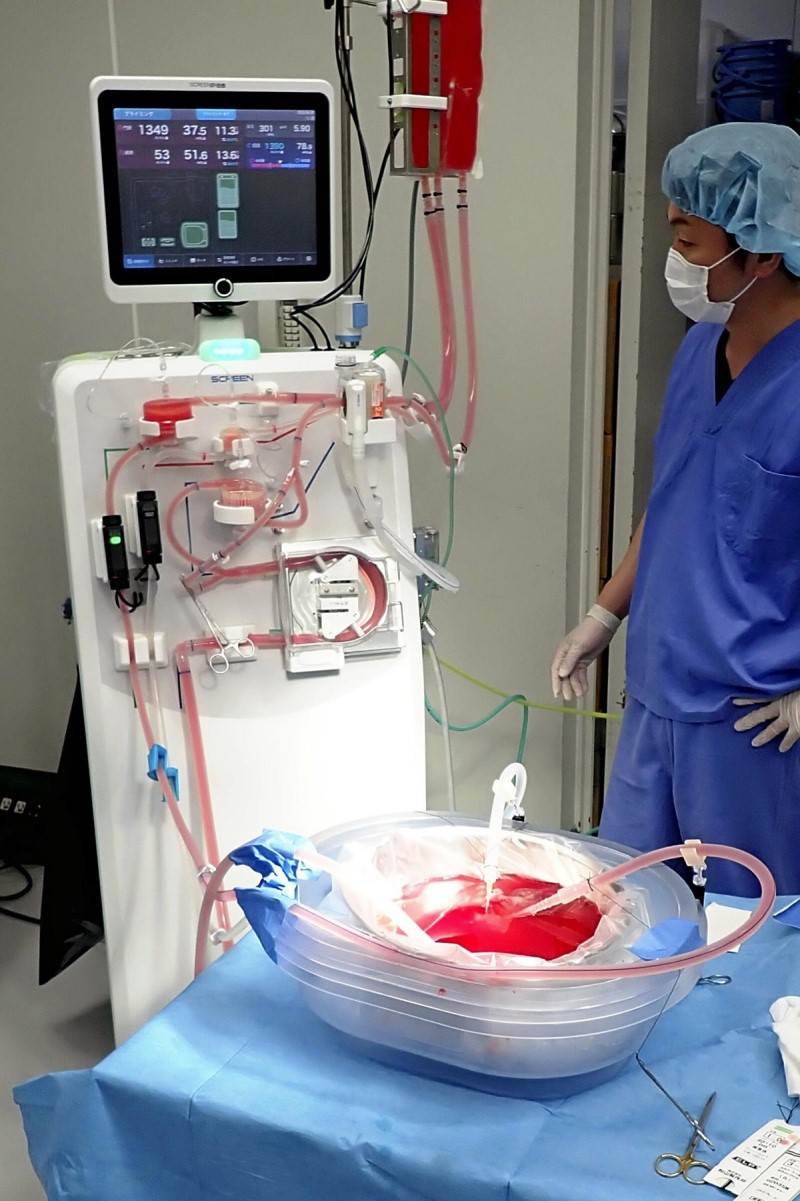Nagasaki Univ. Team Plans Clinical Test to Preserve Liver for Longer Time for Transplant Purposes

A device being developed by Nagasaki University and other bodies is seen. A pig’s liver is in the center of the device.
16:26 JST, May 29, 2024
A research team comprising Nagasaki University and other entities is planning to conduct clinical research as early as next year in which a special device is used to circulate a preservative fluid containing oxygen and other substances in an extracted liver before being transplanted to a patient, The Yomiuri Shimbun has learned.
The device has the advantage of extending the period of time that livers can be preserved for transplant. It has been learned that many transplant facilities declined to accept organs mostly due to insufficient systems and manpower. This technology is expected to improve treatment systems at hospitals.
Currently, organs removed from brain-dead patients are soaked in a preservative fluid and transported in ice-filled coolers. However, the time that organs can be kept in a suitable state for transplant is limited to four hours for hearts, eight hours for lungs and 12 hours for livers.
As a result, even if transplant facilities receive many requests to accept organs, there are often cases in which those facilities decline to accept them because they are unable to provide enough personnel and beds in the limited time available.
The university, Screen Holdings Co., a Kyoto-based machinery manufacturer, and other entities have developed a device that connects a tube to a blood vessel in a removed liver and circulates a preservative fluid. By continuously supplying oxygen and nutrients to the organ at low temperatures, the device can extend the preservation time of the organ by several hours and is expected to improve the organ’s function.
In the planned clinical study, the preservative fluid will be circulated for up to three hours prior to liver transplant surgery at Nagasaki University Hospital to verify the safety and effectiveness after the transplant. Based on the results of the study, the research team aims to apply for approval as a medical device.
This technology is already widely used overseas.
The newly developed device does not require complicated operational procedures and is relatively easy to manage.
“If we can preserve organs for longer periods of time, we can expect to reduce the burden [on doctors and others at transplant facilities], for example, by moving transplant operations planned late at night into the next morning,” said Akihiko Soyama, an associate professor at Nagasaki University. Soyama, who specializes in transplant and gastrointestinal surgery, heads the team.
Top Articles in Science & Nature
-

Japan Institute to Use Domestic Commercial Optical Lattice Clock to Set Japan Standard Time
-

Japan to Face Shortfall of 3.39 Million Workers in AI, Robotics in 2040; Clerical Workers Seen to Be in Surplus
-

Record 700 Startups to Gather at SusHi Tech Tokyo in April; Event Will Center on Themes Like Artificial Intelligence and Robotics
-

iPS Treatments Pass Key Milestone, but Broader Applications Far from Guaranteed
-

iPS Cell Products for Parkinson’s, Heart Disease OK’d for Commercialization by Japan Health Ministry Panel
JN ACCESS RANKING
-

Japan PM Takaichi’s Cabinet Resigns en Masse
-

Japan Institute to Use Domestic Commercial Optical Lattice Clock to Set Japan Standard Time
-

Israeli Ambassador to Japan Speaks about Japan’s Role in the Reconstruction of Gaza
-

Man Infected with Measles Reportedly Dined at Restaurant in Tokyo Station
-

Videos Plagiarized, Reposted with False Subtitles Claiming ‘Ryukyu Belongs to China’; Anti-China False Information Also Posted in Japan





















